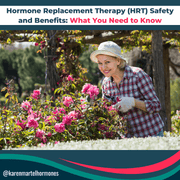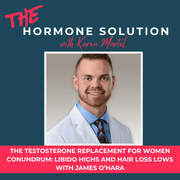There are several hormones that come to play so let’s discuss them and their effect on us in our 40s and beyond.
Estrogen ,Progesterone andTestosterone .
Estrogen, the primary “female” hormone, mainly produced in the ovaries, promotes the growth and health of the female reproductive organs and keeps the vagina moisturized and elastic (gotta love that ESTROGEN)!
Progesterone balances the effect of estrogen and its main job is to help maintain a pregnancy. It is also called the “relaxing hormone”.
Testosterone helps women maintain muscle mass, bone strength and sex drive.
Estrogen, progesterone and testosterone levels tend to fluctuate and eventually decrease production in the 40’s. This can be very startling and cause some women to think, “who are you and what have you done to my body”? This is the start of perimenopause. Perimenopause is the 3-to-5-year time period that leads up to the cessation of the menstrual cycle or menopause.
Menstrual periods are affected during perimenopause by the fluctuation of estrogen as well as progesterone. Periods can be light or very heavy, shorter or longer and closer together; meaning that instead of 28–30-day cycles, it may be 24-27 days apart. Vaginal dryness hot flashes and night sweats are caused by low levels of estrogen. On the flip side, high levels of estrogen result in breast tenderness, bloating and heavy bleeding. In fact, if the woman has any estrogen dominant conditions such as fibroids, cysts, polyps and endometriosis, they are likely to grow faster or progress more quickly.
Fertility is affected even if hormone levels are optimal, which is not the case with women in their 40’s. Because the eggs are aging as well as the quality of the eggs, miscarriage rates can be as high as 60% by age 44 but there are no hard and fast rules.
What about sleep, anxiety and depression? One study in 2015 noted that women are three times more likely to have difficulty with these conditions during the 5 years before the onset of menopause. Thanks to the drop in progesterone and estrogen. Many women find that it takes much more effort to keep a tight butt, firm arms and legs because the drop in testosterone makes it harder to maintain muscle mass and weight can go up more easily.
This doesn’t mean that when you visit the beach your butt has to leave a path from dragging in the sand. Menopause is not an illness. It is simply the end of a woman’s reproductive period and can be handled with dignity and grace.
It is a time to find out what you really want and take charge of this new phase of life. A positive attitude, prioritizing sleep, getting regular movement, replacing our dying hormones with naturalbioidentical hormones and hormone-balancing meals can have a tremendous impact on how you personally experience perimenopause and menopause. In spite of hormone changes, the 40’s are a time when women can really embrace themselves with a level of beauty and confidence that come with experience and maturity. By using that wisdom, we can have a richer more joyful life.
Want to know more about these hormonal shifts? Be sure to download the episode I did "What the Heck is Happening to My Hormones? Perimenopause to menopause, what you need to know."














